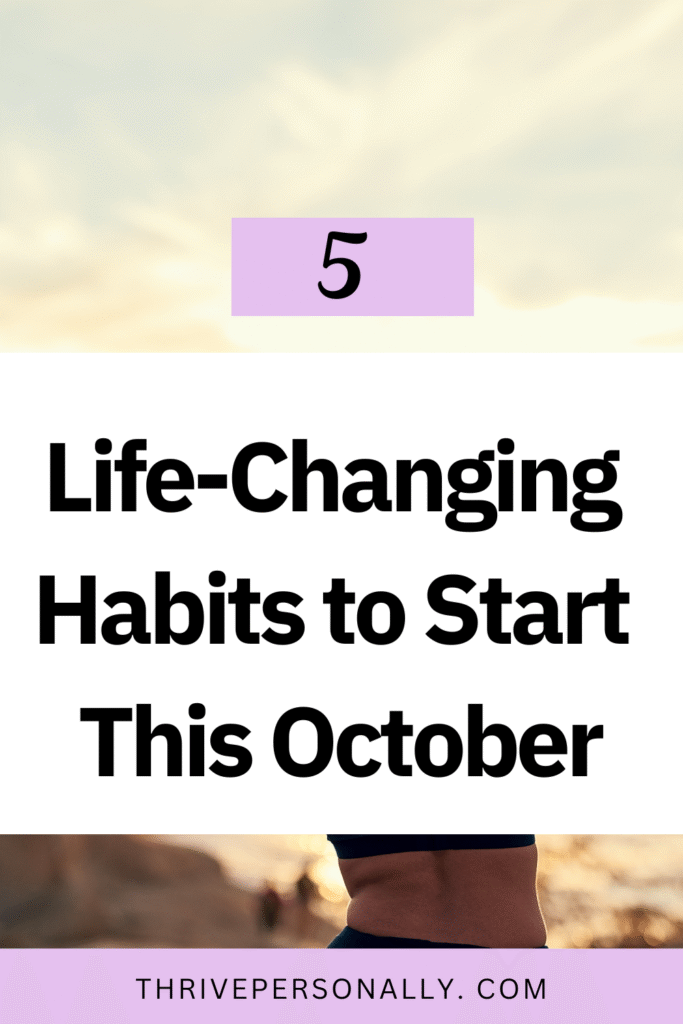I’ll never forget when small shifts added up to a complete life makeover. It happened slowly. One tiny habit at a time, I began feeling better, thinking clearer, and having more productive days. Life-changing habits are effortless routines you repeat that result in big results.
They aren’t limited to a specific size or area of life. You could start small with simple daily rituals or implement larger lifestyle changes. But the common thread is a dedication to improving your health, thinking, and productivity.
Think back to when you first made changes. Was it on New Years? A Friday evening? Maybe summer arrived and you wanted to feel your best. Or maybe it wasn’t any “special” moment at all. You just decided to jump in with two feet.
Tiny improvements made over time become exponential when practiced consistently. One habit sticks — you’re inspired to start another. Here are five habits that can make your life better.
Life-changing habits to implement this month
Habit #1: Give Thanks
Writing down things you’re grateful for is an easy way to shift your mindset and increase happiness. Simply put, gratitude means acknowledging the good parts of your life. From your morning coffee to major life accomplishments, looking for moments that spark thankfulness trains your brain to look for what’s going right.
This can lead to increased optimism and stronger emotional well-being over time. Start a gratitude journal. Each day, take a few minutes to write down three to five things that you’re grateful for that day. Don’t overthink it. What are a few things that woke up and think about? Text from a friend? Sun shining through your window? Your favorite tea? Stretch your body before starting your day? Pick a set time each day to practice gratitude, like after you first wake up or right before bed. Use your phone’s alarm if you have to.
Start small by trying to identify one thing each day that you are grateful for.
Read Also: 30 Gratitude Prompts to Help You See the Bright Side of Life
Habit #2: Move Your Body

Exercise is powerful, and so underrated. Regular movement boosts mood, decreases stress, and helps you think more clearly. Going for a short walk can improve sleep and give you more energy by clearing your mind.
Your goals shouldn’t be to spend hours at the gym every day. Go for consistency and choose activities you enjoy. Try walking 20–30 minutes per day or taking the stairs instead of the elevator. Park further away from stores. Take a standing break during lunch. Stretch between Zoom meetings. Dance to your favorite song first thing in the morning. If you want more variety, look for local sports leagues, take a group fitness class, or search for online workout videos at your current fitness level. Remember: there is no shortage of workout videos online!
Read also: 10 Must-Do Things to Make 2026 Your Best Year Yet
Habit #3: Make Time to Read

Reading consistently is another simple habit that expands your knowledge and gives your mind a break from screens. Pick a consistent time each day to devote to reading. While morning coffee, lunchtime, or before-bed are all great ideas — you don’t need a lot of time to start seeing results. Just five to ten minutes daily will add up in a few weeks and a few months.
Don’t limit yourself to novels or genre you typically read. Read fiction and nonfiction. Explore biography and essays. Check out articles on topics that interest you. Reading a book club can help hold you accountable and give you someone to discuss new thoughts with. If you don’t have time to read an entire book, try reading essays or magazine articles.
Mix up how you read: print, Kindle, and audiobooks! Audiobooks are a great way to read while going about your day chores or on a commute. If you want to minimize distractions, carve out a technology-free block of time to read.
Read Also: 25 things to do instead of pressing your phone
Habit #4: Practice Mindful Eating
Mindful eating is a great habit to build that will improve your relationship with food. Being present during meals by noticing the flavors, textures, and when you’re full can make eating more enjoyable. It also helps you digest food better and prevents overeating.
Begin by putting your phone away while eating meals. Sit down to eat and focus on your food. Eat slowly, chewing well, and enjoying each bite. Wait until the end of the meal to see if you’re even hungry for more. Once you’ve kicked this habit, try adding steps to create mindful mealtime rituals. Take one deep breath before your first bite. Serve food on a small plate. Wait halfway through the meal to assess your hunger.
Prepare most meals at home when you can and plan balanced plates. Out of sight, out of mind. Store junk foods and sweets out of reach or better yet not bought at all.
Habit #5: Connect With Someone
Humans are social creatures and having strong relationships is key to happiness. Checking in with others can help you feel connected to community and improve your mood. Friendships take work, but just like any relationship, small efforts can maintain your bonds.
Touch base with a friend, text someone you’re thinking about, or invest in the local community by joining a group. Make time each week to connect with others, even if it’s a 15-minute phone call or text conversation. Your long-distance friend from college knows. Reach back out and reconnect. There’s always time to make new friends. Look into classes, clubs, or group activities in your area to meet new people that share your interests. Make others a priority and you’ll find it easier to reach out when you need support or celebrate with friends when big things happen.
Once a week try reaching out to a new person. Ask a friend to join you for a quick walk or coffee. Sign up for a meetup group related to your hobbies. Volunteer at your local food bank or library. Run out of things to say? Ask open-ended questions and listen more than you speak. Most people love talking about themselves.
Conclusion
Making time for one or all of these habits can start with just a few minutes here and there. Choose one habit you want to start and try a tiny goal. Write down three gratitude journal entries each week, walk 15 minutes five days a week, or read for ten minutes each day. You can keep track of your new habit in a notebook or use an app. Check in with how it’s going after two weeks.
You may hit some roadblocks along the way. And that’s okay! Use those as learning experiences to adjust your plan, not quit. True change takes time and your plan should be realistic. Trust the process and these five life-changing habits will improve your daily life.
Save the pin for later



